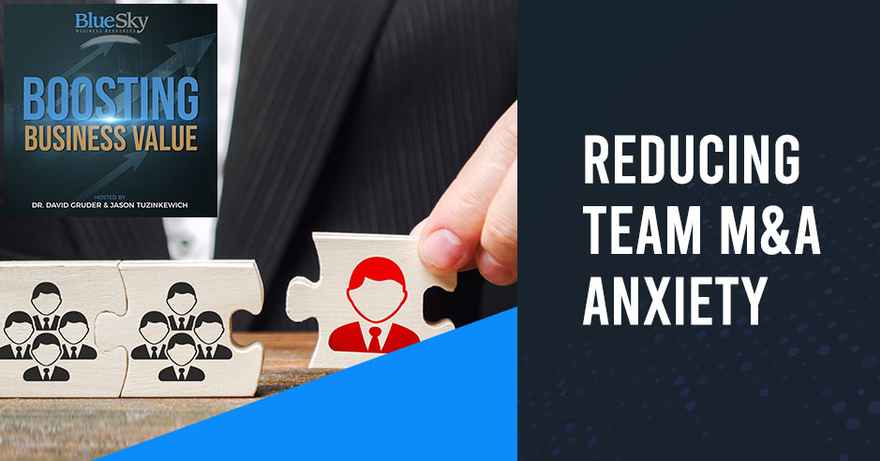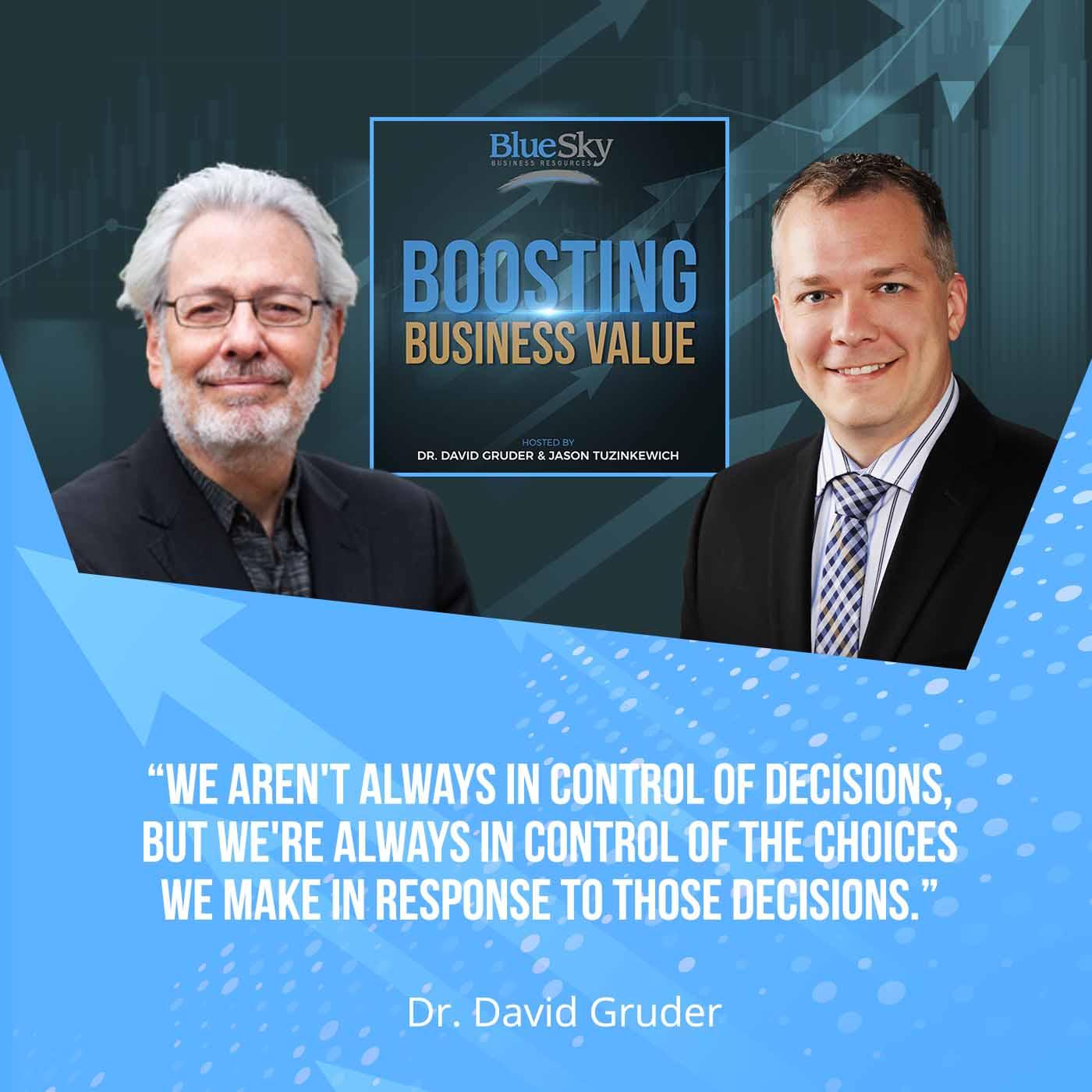Ep. 20 - Reducing Team M&A Anxiety

M&A anxiety is mostly understood from the point of view of the business owner. But how about the team members who are suddenly faced with uncertainty after the sale? In this episode Jason Tuzinkewich and Dr. David Gruder chip away at some familiar questions about M&A anxiety from an unfamiliar angle: the perspective of team members deciding whether to stay, rather than that of the owner who's selling. They provide anxiety-reducing guidelines for team members to decide whether to stay or leave after their company is sold and tips for enacting their decision in ways that are respectful to all. Tune in and arm yourself with knowledge, so that when you find yourself in this situation, you have the ability to turn that change and uncertainty into just another friggin’ growth opportunity!
---
Watch the episode here
Listen to the podcast here
Reducing Team M&A Anxiety
Making Your Team So Indispensable That The Acquirer Would Be A Fool To Not Retain Them
In this episode, we’re going to look at some familiar questions from an unfamiliar angle. We’re going to take the perspective of team members who are facing M&A transactions instead of that of the owner who’s selling. The big questions we’re going to address are, “How do you manage M&A anxiety? What questions do you as a team member need to ask? How do you discover those answers and take action?” With me as always is my friend, co-host, and partner in crime, Dr. David Gruder, Blue Sky’s Business Lifecycle, Exit Planning, and Post-Acquisition Psychologist. Welcome, David. Good to see you again.
Thank you, Jason. It’s great as always to be with you. Let’s get this baby rolling. Let’s start off with the big question of what the devil is team M&A anxiety in the first place. There are basic questions that are going to fuel what we’re going to deep dive into in this episode. Those two basic questions related to M&A anxiety on the part of team members are, first of all, “Do I want to stay after the sale? If so, will I be able to stay? Do I want to leave after the sale?” Those are the big basic questions that each team member is going to need to answer for themselves. We’re going to be discussing how to go about answering those questions but why don’t you go deeper, Jason?
Those questions seem so simple on the surface but the implications are huge. It’s not just an implication for your own personal life as you make those decisions but it impacts your family. It impacts the business that is undergoing a transaction, your teammates, and your friends. Let’s take this seriously because the weight of those implications can add additional anxiety and stress to the complexity of an already unnerving situation.
Some of those underlying questions that provoke and create anxiety around making these decisions are questions like, “What will this sale look like for the company, for me, as an individual, and for my team? Do I want to be a part of that change? Can I be a part of that change? Do I have any control over my destiny other than exerting control by leaving? What will it mean for me, my life, my family, and all those other stakeholders in my life once I’ve committed to a path?”
That whole piece of control keeps coming back up in all of these questions. 1) What is the impact? 2) How much power do I have over the impact? Whether I make a decision or not, will a decision be made for me? If I do make a decision, can I live up to that decision? Finally, once I’ve made a decision, how do I communicate that to the people around me in a productive and not destructive way to make sure that I can help facilitate mutual success in the decision that I’ve made? With all of that said, let’s dive right into the big challenges. As we see it, we can break it down into four key big challenges that need to be taken into account when you’re trying to overcome this anxiety.
We know that anxiety and stress foster bad decision-making. Let’s create this framework of understanding, recognizing, and naming challenges so that we’re better equipped to tamp down those emotional barriers to good decision-making and open up the floodgates to productivity and success. The number one thing, and this is going to be the big skeleton in the darkest closet, is that innate fear of the unknown. The less we know, the more our imagination will create terror. That’s going to be the first, the biggest, and the darkest challenge to face in the name. it’s recognizing that I don’t know a whole lot and that is causing the worst-case scenario to become prominent in my brain.
The less we know, the more our imagination will create terror.
That is a huge anxiety piece. Paired up with that anxiety piece as if that wasn’t enough by itself, is an internal disdain for change. There’s an old cliché, “It may be hell but it’s home.” What I often refer to it as is status quo addiction. Whatever we’ve gotten used to is what we then are often inclined to keep supporting even after its outlived its usefulness. This is a misapplication of an important part of being human, which is our incredible capacity to adapt.
The golden side of adaptation is that when we adapt in useful ways, we become more productive, involved, passionate, purpose-driven, and things along those lines. The shadow side of our tendency toward adaptation as human beings is that if we don’t watch ourselves, we’ll adapt to the unacceptable. We’ll support having ourselves adapted to it.

When there’s this disdain for change, which is about not trusting our ability to keep growing and keep transforming in the face of the unexpected, unanticipated, or even undesired, this is a big fear that a lot of people have that causes either paralysis that people get stuck in or paralysis that people rebel against by becoming impulsive in their decision-making.
I love that you showed both sides of that coin, Doctor. That’s great. We can all relate both personally and within our sphere of friends to people that have gotten stuck in an environment that isn’t conducive to joy. From an outsider, it’s so easy to see the two steps to the left that it would take to get out of it but for the insider, that inertia is so strong that you stay stuck. I’ve been there at times in my life as well, so I appreciate you bringing that up and showing both sides of the impact.
I know that firsthand, of course. Both sides of that.
All of this is fear of the unknown and this disdain for change. One of the problems that amp up this anxiety is the fact that you are not going to achieve full transparency. You’re not going to be able to have all of your questions answered about what the future will look like post-closing. It’s not plausible. There are confidentiality issues as well as a time constraint and nobody knows the true nature of what the future’s going to bring.
How do you bridge all of those anxiety-inducing compounding elements to get yourself as much information as possible, gain clarity, if not transparency, and be able to be well informed to tamp down some of these things? That is a tricky situation to be in, balancing between how much information is reasonable to expect that I can use to gain comfort and some site forward and how do I deal with the elements that I cannot expect to know fully.
Compounding things even further is the fourth of the big challenges.
There’s more?
If you’re not anxious enough, just wait. It will make you anxious. The fourth of the big challenges that we want to touch on that have to be addressed in order to reduce team member M&A anxiety is about autonomy and control. The autonomy piece is that part of our wiring as human beings has to do with our free will. Free will translates into personal freedom. That’s about autonomy. How do I be the sovereign of my own life?
Where that comes into play is when we feel like we’re out of control with choices that are being made that are going to impact us such as a choice to sell a company that we work for. If we’re not the owner of the company, we probably have very little control over whether or when the company we work for is going to be sold. When we have our drive free for autonomy and we don’t have control over certain decisions that are going to impact our self-sovereignty, that brings up a huge amount of anxiety.

There’s a term for that form of anxiety and it’s called authority shadow. When we have uncomfortable or ineffective relationships with people who are in leadership positions or decision-making positions, we will channel that discomfort either by shutting down and becoming yes people and simply pretending to be compliant when we’re not or by attacking people who are the decision-makers. Throwing arrows at them simply because they’re decision-makers or by trying to do sidesteps around the system passive-aggressively.
All of those are different manifestations of authority shadow but authority shadow exists in most of us because people in our past were in control of certain decisions that impacted us in ways that felt harmful, tyrannical, or inhibited our autonomy or our freedom. All of us, if we have authority shadow issues, if we have discomfort or rebellious or submissive attitudes toward authorities, toward people who make decisions, we come by those honestly.
That doesn’t mean that we’re justified in staying stuck in authority’s shadow. It’s about stepping out of that and reclaiming our autonomy and our self-sovereignty in relation to decisions that we aren’t always in control of but we’re always in control of the choices we make in response to those decisions that have been made.

You said a mouthful. I love that every session that we have on this show, my vocabulary grows. Thank you so much for that.
You’re welcome.
Tell me, is there hope?
There’s hope. There’s a success roadmap for dealing with all of this. It’s got a couple of components. We’re going to unpack them one at a time. The first component of the success roadmap for dealing with M&A anxiety is the autonomy piece. It has to do with us getting clear. Us utilizing a potential sale of a business that we work for as an important opportunity for us to reassess what our career dreams are, what our purpose is in being part of the workforce, and to recognize that we have far more power than we think in terms of if we make a decision to stay.
A good workforce is hard to come by and any sophisticated buyer of a business knows that. If we decide that staying is in line with whatever our career dreams are that we get to revisit and either reaffirm or modify because an M&A might be in the offing. If we decide we want to stay, even after the company is sold, we can make ourselves indispensable. If we do that because we want to stay, it’s likely that we’ll be retained if that’s what we want to be because a good workforce is so hard to come by.
Beautifully stated and to give you a little reciprocity on vocabulary learning, I have a term for this. I like to call it the kick-in-the-pants benefit. What happens is people always want control but as you described earlier, this desire for control sometimes bleeds itself off in negative ways because you haven’t taken the time to determine what you want. You’re just reacting.
This change gives you that kick in the trousers to think about, “Before I behave badly, before I react to the situation, let’s assess. Let’s figure out what I really want.” Thinking about what you want gives you control back. It gives you the power and the ability then to exert your autonomy in a productive fashion. I love that taking that assessment is your first step to success in dealing with this anxiety.

I love that you are calling this something that I’ve not heard phrased this way before, a kick-in-the-pants benefit.
There you go. You’ll find it in a lot of psychological books from here on out.
We have a psychological disorder now called the kick-in-the-pants benefit disorder, where people are afraid to rise to the kick-in-the-pants.
It’s a type of phobia.
Kick-in-the-pants phobia. There we go.
Once you’ve decided all of these things and started to get yourself on a little bit of firm footing because you have this control of knowing what destiny you desire, then you can start shaping it. The best most productive way to start shaping it within the confines of considering an M&A transaction and dealing with anxiety is developing and cultivating open and honest communication.
When you know what destiny you desire, you can start shaping it.
This is going to have to be driven by the team members because the team members are at the village mushrooms. They’re in the dark and they’re fed a lot of. They’re going to be the ones that are reacting to fear the most. If you, as a team member, step up and say, “Let’s start asking some good questions. Let’s start figuring out the bounds of what we can know and ask those questions so that we can have a little bit of clarity and start to gain that vision that we were talking about.”
The other side of that is everybody around you, everybody in the team is dealing with the same anxiety. There will be a lot of fear-based speculation. We all know that the unknown is where all the monsters live. If we don’t know what’s happening, then we assume the worst. It’s natural instinctive behavior. We could chalk it off to our hunter-gatherer days but recognizing that. Again, recognizing these challenges, giving them a name, and turning the light on so you can face them head-on, makes them a lot less scary.
Again, if you are thinking about whether or not I want to leave, I want to be indispensable. If I choose to leave, I want to be missed. If I choose to stay, I want to have control over staying. Being a leader in clear, honest, and direct communication and being the leader that stifles that fear-based pontification amongst the team is the most power that you could ever exert to help your team members, to help your business owner who probably is a boss that you care for, and to help the success of the organization around you no matter which destiny you choose.

Isn’t it a sacred blessing that we get to help people with these kinds of questions and discover their own answers to these kinds of questions?
I was at a conference weeks ago and I was talking about dealing with this exact scenario. The private equity firm representative that I was talking to, he’s like, “So what? You have a psychologist on your team?” As a matter of fact, we do.
The third element in our success roadmap has to do with an outgrowth or an outcome that emerges from asking good questions. Once you’ve got more of a picture of what’s in store, then you can determine whether there is a match or mismatch or how much of a match or mismatch there is between your dreams and the sale of the business.
As you were so beautifully saying, Jason, it’s so important for everyone. Regardless of whether they’re staying or leaving or whether they know if they’re staying or leaving, get involved in the transition and sale preparation process so that you get to know and ask the right questions. You get to know how much of a match there is between your career dreams, the kick-in-the-pants benefit that you’ve gotten because this sale is coming up, and the way that the merger or the acquisition is going to happen.
Once you’ve been involved in that preparation process, then if you think, “I’m not sure if I want to stay or go even with the information that I have,” that also is an opportunity for you to do something that I have found is far too rarely done by people, which is to envision what your best dreams, career dreams, and M&A match would be based on the information that you’ve acquired.
When I ask people that I mentor, “What would your ideal job be if such and such happened? What would your ideal role be? If this sale goes through, what is the role that you would most love to fill?” Daring to ask yourself that question internally is a great way of discovering not only whether you want to stay or you want to leave. More importantly, if you do stay, is there an opportunity for you to recraft your role so that it’s going to be even more what you want it to be in the post-merger or acquisition process?
This goes back to that control piece. Most sophisticated buyers of businesses are looking for personnel. If they see an individual who is engaged in the process, who is engaged in success, was communicating effectively, and comes to them and says, “I have this vision for how I could deliver value to the new company.” Whether that’s a larger whole or the same company with new growth expectations, the buyer is going to listen. The buyer may not always say, “We can do that,” but the buyer will listen. They’ll be interested and you’ll be valuable in their mind because you’re already pegged as a proactive solutions individual.
They’ll listen. They’ll be interested and impressed.
You mentioned that people don’t do this. For those of you who have been reading our episodes, you’re going to start to see this pattern in how we address and deal with success roadmaps. We also feedback on the information we talked about before. This learned helplessness that we talk about a lot is the driver of inertia we mentioned before, the fear of change, as well as the driver for not believing enough in the value and the reality of envisioning your best future professionally and then going out and making it happen. I love that you bring that up and that it feeds off of what we talk about a lot.
I’m glad that you tied this in explicitly with the learned helplessness issue.
It’s important. The more we shine a light on these negative things, the more people can, myself included, recognize it and say, “I know what that is. Dr. G gave me a name for that. Now let’s address it and move forward.”
As a colleague of mine and friend of mine, David Corbin says in one of his bestselling books, “Illuminate the negative. Accentuate the positive.” Instead of illuminating the negative, which is a form of denial, illuminate the negative so that you can then accentuate the positive.
“Accentuate the positive, illuminate the negative” - David Corbin
You got to face it or it will chase you. I love that. Closing the loop on this success roadmap, as we like to do, we like to put a pretty bow on it and make sure that everything is tidied up. The last piece is communicating. The specific communication we’re talking about at the end of the success roadmap is communicating to the seller and potentially the buyers depending on where you’re at in this process and in the organization.
Communicate with them what your decision is and how to best manifest that decision. Those are some important things. Let’s take a little bit of time on it. First off, deciding how, when and to whom you’re going to break the news is important. Also, it’s critical to remember that an emanate process is a very volatile situation. There are 1 million things that could make an M&A transaction fall apart and there are a handful of things that can help it close.
Once you’ve made the decision, “I want to be a part of this or I do not want to be a part of this,” you’re making a very impactful decision, Understanding the implications of that decision, and treating that decision with care is going to be critical. If you decide that you do not want to stay through the transition, talk with the seller. Be transparent. This is a person who’s been your boss for a while, presumably. Figure out a plan of how you can extricate yourself from the business in a reasonable fashion that doesn’t derail the transaction. Killing a transaction because you decide you don’t want to be a part of it, is not a healthy response to any of this.
Supporting the transaction even though you choose not to be a part of its future is a higher-order decision. It’s the more respectful decision. It’s going to help you not burn bridges as you move to the next stage of your career. Now, when you decide that you want to be a part of this, communicating with the seller and your boss first is still going to be the most important thing.
There’s a chance that you could say, “Not only do I want to be a part but I have some vision for how I can bring my best self to the new company. Would it be okay to talk with the purchaser about this vision?” If it’s a productive, proactive vision, most sellers are going to say, “That strengthens the success of the transaction. Please, let’s set up this meeting. Let’s go do it together.” Again, that’s giving you control and credibility, making you indispensable, and helping to give you the best possible chance of achieving your ideal future with this new partner.
This is an overlooked roadmap for dealing with team M&A anxiety. I’m so glad that we’ve covered this territory in this episode. It’s probably time to move on to our takeaways before wrapping this up.
Thank you so much. This has been fun. I’ve learned some things as we’ve discussed it. For me, the biggest key takeaway that I want people to leave this episode with is very simply that as an individual, as a cog in the bigger machine that is being sold, it’s so easy to become helpless and to feel powerless and like a victim of a change.
It’s important to point out that you have so much more control than you would assume in this scenario. You can assume that and exert it in a way that’s going to be exponentially positive, not just for your own future but for your team members and for the future of the business. No matter what you choose is your best path forward.
The other takeaway that we think is important from this episode is again to view the M&A process as your own growth opportunity, again, as a kick-in-the-pants benefit. Instead of as an invitation into a downward spiral of anxiety that’s inevitably going to lead either to you being paralyzed or you being impulsive in your decisions. This is an AFGO instead. If you don’t know that acronym, I’ll do the version of it for polite company, AFGO stands for Another Frigging Growth Opportunity.
On behalf of the wonderful ever enthusiastic and articulate Jason Tuzinkewich and myself, we thank you once again for reading this episode. We, as always, invite you to click the Subscribe button so you can be notified immediately when we release future episodes. We also particularly look forward to reading your thoughts, questions, topics, suggestions, and other requests in the comment section at the bottom of each episode’s page.
It’s through your feedback that we know what’s important for us to cover in future episodes. Lastly, we invite you to take advantage of our free surveys for helping you gauge your business’s health more accurately and its opportunities more effectively. Each of those great surveys includes real-time feedback and recommendations. Go ahead and visit BlueSkyAdvisors.net to get started.


0 comments
Leave a comment
Please log in or register to post a comment